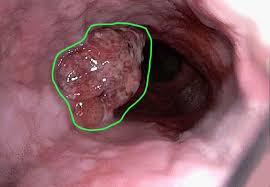Malignant esophageal neoplasm, commonly known as esophageal cancer, is an aggressive malignancy that affects the esophagus, the muscular tube connecting the throat to the stomach. It is often diagnosed at an advanced stage due to its asymptomatic nature in the early phases, leading to a poor prognosis. The two most common histological types of esophageal cancer are adenocarcinoma and squamous cell carcinoma.

Types of Malignant Esophageal Neoplasm
- Squamous Cell Carcinoma (SCC): Arises from the epithelial cells lining the esophagus, primarily affecting the upper and middle sections.
- Adenocarcinoma: Originates in the glandular cells of the esophageal lining, commonly found in the lower esophagus.
Causes and Risk Factors
Several risk factors contribute to the development of esophageal cancer:
- Tobacco and Alcohol Consumption: Prolonged smoking and excessive alcohol intake significantly increase the risk of SCC.
- Gastroesophageal Reflux Disease (GERD): Chronic acid reflux can lead to Barrett’s esophagus, a precursor to adenocarcinoma.
- Obesity: Increases the likelihood of GERD and adenocarcinoma.
- Dietary Factors: A diet low in fruits and vegetables but high in processed foods and red meats may contribute.
- Genetic and Environmental Factors: A family history of esophageal cancer and exposure to harmful chemicals can elevate risk.
Symptoms of Esophageal Cancer
Esophageal cancer often remains undetected until it reaches an advanced stage. Common symptoms include:
- Dysphagia (Difficulty Swallowing): Progressive difficulty in swallowing solid and liquid foods.
- Unintended Weight Loss: Rapid and unexplained weight loss.
- Chest Pain or Discomfort: Persistent pain or burning sensation.
- Hoarseness or Chronic Cough: Due to tumor compression on vocal cords.
- Regurgitation or Vomiting: Difficulty in passing food through the esophagus.
Diagnosis and Staging
Early diagnosis is crucial for improving survival rates. Common diagnostic procedures include:
- Endoscopy: A flexible tube with a camera is inserted into the esophagus to visualize tumors.
- Biopsy: Tissue samples are extracted and examined for cancerous cells.
- Barium Swallow X-ray: Highlights irregularities in the esophageal structure.
- CT Scan and MRI: Assess tumor size, lymph node involvement, and metastasis.
- PET Scan: Helps in detecting distant cancer spread.
- Staging: Cancer staging (I-IV) is determined based on tumor size, lymph node involvement, and metastasis.
Treatment Options
Treatment depends on the cancer stage and patient health condition.
1. Surgical Intervention
- Esophagectomy: Removal of the cancerous part of the esophagus with possible reconstruction.
- Minimally Invasive Surgery (MIS): Advanced laparoscopic techniques to reduce recovery time.
2. Radiation Therapy
- External Beam Radiation Therapy (EBRT): High-energy rays target cancer cells.
- Brachytherapy: Internal radiation placed near the tumor for localized treatment.
3. Chemotherapy
- Drugs such as cisplatin, fluorouracil (5-FU), and paclitaxel are administered to destroy cancer cells.
- Often used in combination with radiation therapy (chemoradiation) before or after surgery.
4. Targeted Therapy and Immunotherapy
- Trastuzumab (Herceptin): Used for HER2-positive esophageal adenocarcinoma.
- Nivolumab and Pembrolizumab: Checkpoint inhibitors that enhance immune response against cancer cells.
5. Palliative Care
For advanced-stage patients, palliative treatments include:
- Stent Placement: Keeps the esophagus open to facilitate swallowing.
- Pain Management: Opioids and nerve block techniques to alleviate discomfort.
Prognosis and Survival Rates
Prognosis varies based on the stage at diagnosis:
- Localized Stage (Stage I-II): 5-year survival rate ~40-50%.
- Regional Spread (Stage III): 5-year survival rate ~20-30%.
- Distant Metastasis (Stage IV): 5-year survival rate ~5%.
Early detection and prompt treatment significantly improve survival outcomes.
Prevention Strategies
- Quit Smoking and Limit Alcohol Consumption
- Maintain a Healthy Diet Rich in Fruits and Vegetables
- Manage GERD with Medications and Lifestyle Changes
- Regular Screening for High-Risk Individuals
Malignant esophageal neoplasm is a serious condition requiring timely diagnosis and treatment. Advancements in surgical techniques, radiation therapy, chemotherapy, and immunotherapy provide improved survival rates. Awareness of risk factors, symptoms, and preventive measures can aid in early detection and better management of the disease.